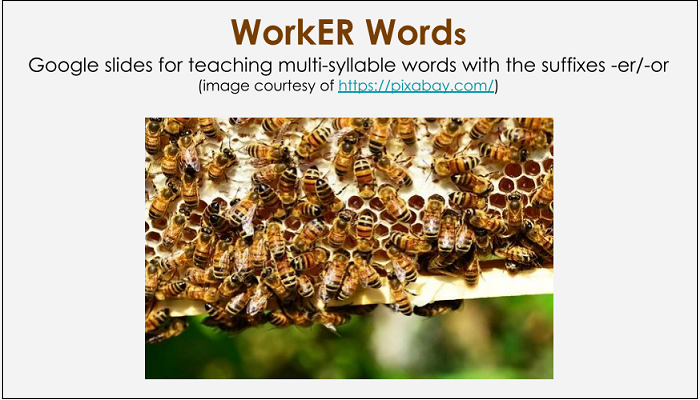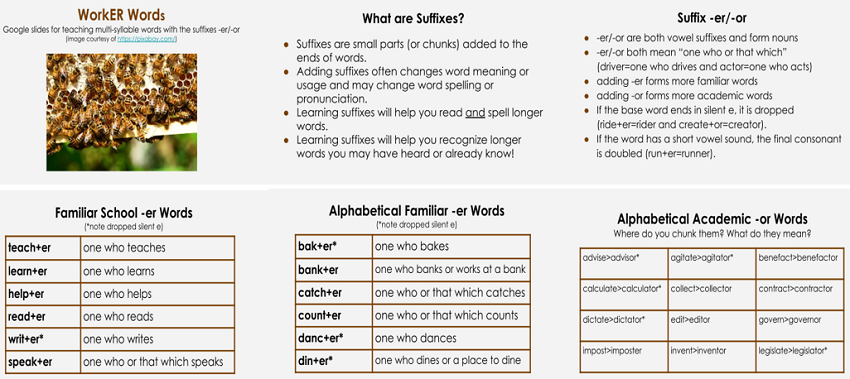- MN ABE Connect
- Archive
- Introducing e-Advanced Alphabetics
 March 29, 2021
March 29, 2021
Introducing e-Advanced Alphabetics
Marn Frank, ATLAS Literacy & STAR CoordinatorMany of you are aware of my passion (some might say obsession?) with the long and wide continuum of alphabetics — from alphabet letter names/forms to letter/sound/syllable/suffix/prefix/root patterns. It’s based on evidence that says all-age, struggling readers benefit from systematic and explicit alphabetics instruction. Over time and with effort, this results in more automatic (or quick and correct) word reading and spelling. Regular “word study” also supports text fluency, recognition of word meaning, text understanding, writing fluency, and reading/writing confidence.
We are all aware of how the pandemic and transition to distance or remote teaching and learning has been complicated and challenging. In spring and fall surveys of STAR/EBRI teachers, a need was reported for online phonics, syllabication, and morpheme lessons for adults. This inspired me to develop slide sets (or lessons) for remotely teaching decoding of compound, suffixed, and prefixed words.
The curriculum is called “e-Advanced Alphabetics” and offers:
- A focus on suffixes (-ly, -er/-or, -y, -ion, -able/-ible, -al/-ial, -ment, -ful) and prefixes (in-, un-, mis-, dis-, re-, de-, pre-, en-) found in many multi-syllable words (posted and ready-to-use).
- Flexible sequencing and selection; meaning, you can start with any slide set, teach any words, and assign any activities (or add your own).
- Clear descriptions of a compound, suffix, prefix, and how the addition of words or parts can change spelling, meaning, pronunciation, and usage.
- An explicit instruction model that moves from teacher explanation to modeling to guided practice to student application of taught word skills.
- Scaffolded presentation from familiar or basic to less familiar or academic words with chunking, meanings, examples, or synonyms to without (for guided decoding and meaning-making).
- Concluding activities for matching words and simple meanings, sentence combining, or write to read paragraphs that can be completed individually or in small or large groups.
Here are six screen shots from WorkER Words, a multi-slide lesson for teaching suffixes -er/-or and familiar to academic words over several days or weeks:

In late September, I asked several STAR 19/20 participants to review a few e-Advanced Alphabetics slide sets. Below are their valuable feedback comments:
- “I like these slides to teach suffixes and compound words. I appreciate that the slides are ready to use.” (Helen Ahearn, SW Metro)
- “It was great to receive materials for online teaching, which learners found not too difficult and enjoyable.” (Marillyn Gjerde, St. Paul Hubbs)
- “I have been working with the slides in my advanced ESL classes. The slides help students review the definition of suffixes and practice with several suffixes they commonly use and encounter.” (Beth Edwards, Metro South)
- “I just skimmed the titles of your e-alphabetics; fun titles – made me want to try them immediately.” (Terrisa Fisher, West ABE)
If you are interested in viewing or using e-Advanced Alphabetics, you can find it in the ATLAS Reading resource library by clicking on Reading Components and then Alphabetics in the right-hand menu.
Several new slide sets have been added since this resource was first posted! Keep checking back, as more slide sets will be developed and uploaded over the coming months.
If you have any questions, comments, or corrections, please email me at [email protected].
Originally published 10/19/20
Newsletter Signup
Get MN ABE Connect—the official source for ABE events, activities, and resources!
Sign UpArticle Categories
- ABE Foundations/Staff Onboarding
- ACES/Transitions
- Adult Career Pathways
- Assessment
- CCR Standards
- Citizenship
- COVID-19
- Cultural Competency
- Digital Literacy/Northstar
- Disabilities
- Distance Learning/Education
- ELA
- Equity/Inclusion
- ESL
- HSE/Adult Diploma
- Listening
- Math/Numeracy
- Mental Health
- Minnesota ABE
- One-Room Schoolhouse/Multilevel
- Professional Development
- Program Management
- Reading
- Remote Instruction
- Science
- Social Studies
- Speaking/Conversation
- Support Services
- Teaching Strategies
- Technology
- Uncategorized
- Volunteers/Tutors
- Writing